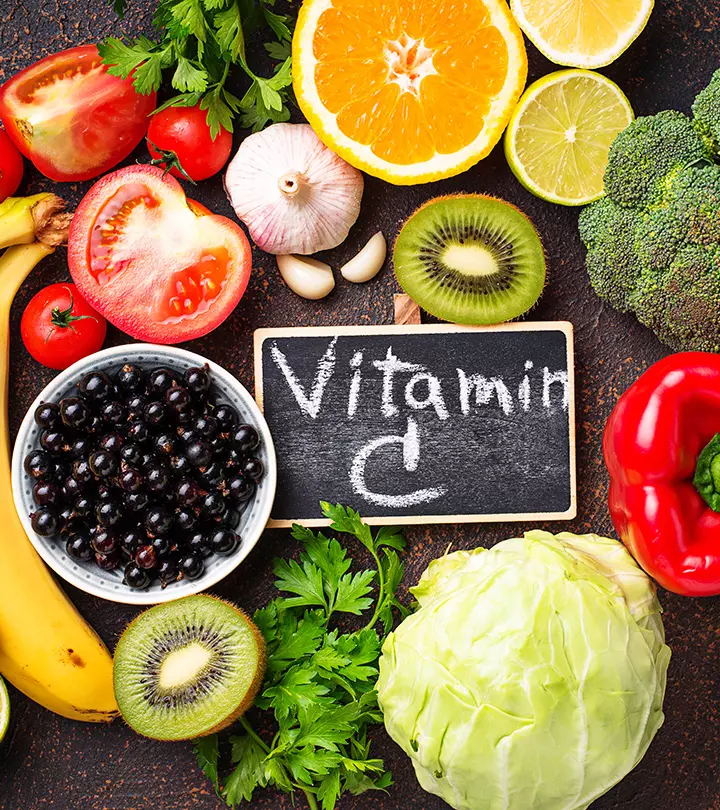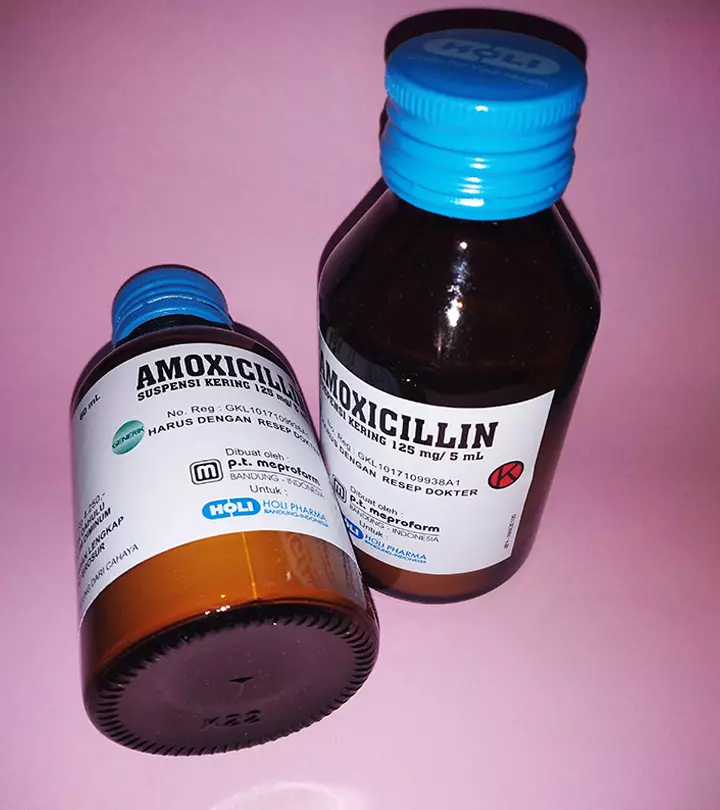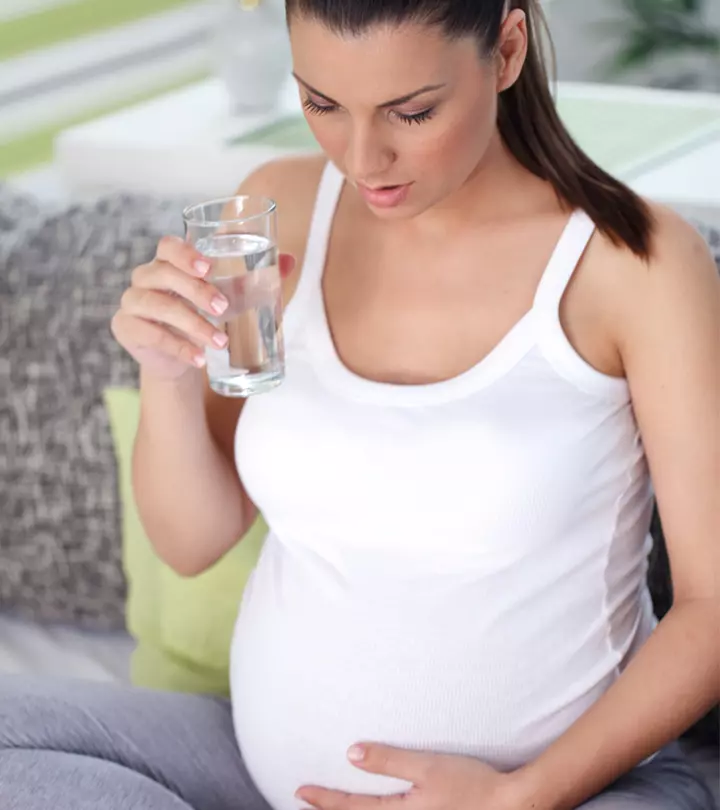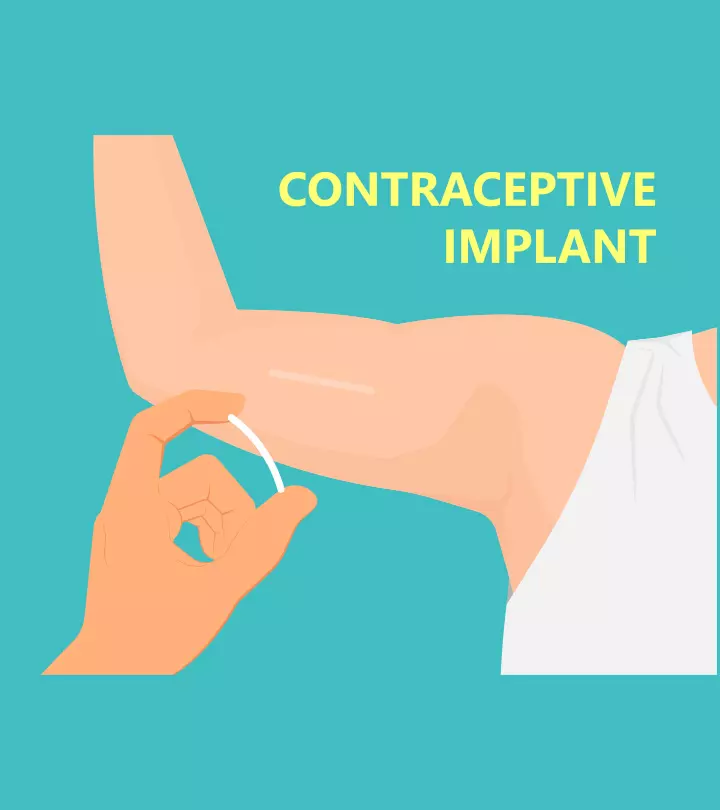
Image: iStock
There is no scientific evidence on the use of vitamin C to prevent pregnancy. Vitamin C is a micronutrient that helps bone and tissue development and wound repair (1). Although some anecdotal beliefs exist that higher doses of vitamin C can be an alternative to birth control pills or abortion methods, experts do not recommend vitamin C for birth control or terminating a pregnancy. You may seek a doctor’s advice to know more about safe and effective birth control measures.

Read on to know about the use of vitamin C for preventing pregnancy and its side effects.
Key Pointers
- When consumed in adequate amounts, vitamin C aids in proper tissue growth and repair.
- But vitamin C may act as a contraceptive when taken in excess.
- Consuming more than 2000mg of vitamin C during pregnancy may cause miscarriage.
Can Vitamin C Prevent Pregnancy?

Some studies stated that more than the recommended levels of vitamin C could interfere with the progesterone secreted from the corpus luteum. Since progesterone prepares the endometriumiThe tissue that lines the uterus or womb for implantation and sustains the pregnancy, reduced pregnancy hormone levels may help prevent pregnancy (2).
Conversely, a study conducted on women with and without vitamin C supplementation found no definitive evidence linking vitamin C to the prevention of pregnancy or spontaneous abortion (3). Vitamin C intake as an alternative to birth control pills has been discussed, but there is no substantial scientific evidence to prove its efficacy.
Obstetrician and gynecologist Dr. Shashwat Jani says, “There is limited scientific evidence to support the claim that high doses of vitamin C can induce abortion or prevent pregnancy. A few studies have studied the potential effects of vitamin C on pregnancy, but the results are inconclusive and often plagued by methodological limitations.”
Dr. Po-Chang Hsu from the Boston Metropolitan Area says, “One of the most common claims is that vitamin C can disrupt progesterone levels, a hormone essential for maintaining pregnancy. However, no credible studies support this theory. What’s more, high doses of vitamin C are more likely to cause side effects like nausea, diarrhea, and stomach cramps than to influence reproductive processes. The body does not store or accumulate vitamin C in a way that could trigger a miscarriage.” Hence, you should consult with your OB-GYN about effective contraceptive methods.
How Much Vitamin C Should You Take To Prevent Pregnancy?
It is believed that if taken above the limit of 2000 mg per day, vitamin C can cause abortion or prevent pregnancy. However, there is not enough evidence to confirm this claim, and it is advisable to consult your OB-GYN for better abortion techniques or contraception methods.
The dosage of vitamin C is 85 mg per day for pregnant women of 19 years and above and 80 mg per day for pregnant women between the ages 14 and 18 years. The upper limit for safe consumption in both cases is 2000 mg per day (4).
 Research finds
Research findsHow To Use Vitamin C To Prevent Pregnancy?

The use of vitamin C as contraception for family planning to prevent pregnancy has not been studied enough to confirm its efficacy. However, some of these methods are believed to prevent pregnancy, but are not recommended by medical practitioners
- Vitamin C tablets placed inside the vagina during intercourse can prevent the sperm from passing through the cervix by killing them.
- Vitamin C, along with lemon juice, can probably reduce the chances of conceiving. If taken after conception, large quantities of lemon juice are likely to cause a miscarriage.
Note: These methods are not scientifically proven and may pose potential health risks. Consult a healthcare professional to learn about the safe methods to prevent pregnancy.
 Quick fact
Quick factWhat Are The Other Impacts Of Vitamin C Overdose?

Besides miscarriage, another serious concern of vitamin C overdose during pregnancy is scurvy. Scurvy is a condition characterized by muscle pain and bleeding or swollen gums due to vitamin C deficiency. Babies born to mothers taking around 6,000mg or more of vitamin C may suffer from rebound scurvy because there is a sudden drop in the level of vitamin C post-delivery (5). High doses of vitamin C also increase the maternal risk of developing kidney stones as excess vitamin C can potentially increase the oxalate amount in urine, leading to the formation of kidney stones. Some other health risks associated with excess consumption of Vitamin C supplementation include nausea, diarrhea, abdominal pain, and other gastrointestinal discomforts (6).
Deficiency of vitamin C during pregnancy is also believed to increase the risks for preeclampsia, a pregnancy complication characterized by high blood pressure. However, the research to support this subject is minimal (7).
What Are The Other Options Of Abortion?

Given that vitamin C as a contraceptive option lacks scientific evidence, you may consider other conventional options of abortion after consulting with your OB-GYN. These include medical abortion (abortion pills) and surgical abortion.
Medical abortion involves the administration of abortion pills. It is a course of two abortion pills, namely, mifepristoneiA medication used to cause an abortion or manage an early miscarriage and misoprostoliA medication used to treat ulcers, induce labor, and cause abortion , taken in a specific order. The misoprostol is a pack of six tablets and should be taken after the first pill, mifepristone.
In the case of surgical abortion, it may either be a vacuum aspirationiAsurgical abortion that uses gentle suction to remove the fetus through the cervix or dilation and evacuation methodiA method of abortion by cervix dilatation and the surgical evacuation of the uterus . In the first procedure, a suction device inserted through the dilated cervix is used to empty the uterus. For the dilation and evacuation method, the process is similar to vacuum aspiration, except other medical instruments and the suction are used to empty the uterus from remaining pregnancy tissues (8).
Frequently Asked Questions
1. What can happen if I take too much vitamin C while pregnant?
An excessive intake of vitamin C is seldom harmful. However, those with a family history of kidney disease should be careful since excess vitamin C acidifies the urine, increasing the risk of kidney stones (9) (10).
2. Can too much vitamin C cause congenital disabilities?
There is insufficient evidence linking excessive consumption of vitamin C to congenital disabilities or any other effects on the growing fetus (3). According to a World Health Organization (WHO) study, vitamin C supplementation is not associated with infant-related outcomes such as stillbirth or congenital malformations (12).
3. How long does it take for vitamin C to work as a form of contraception?
There is no clinically significant study to back the claim that vitamin C may work effectively as a contraceptive pill. However, consecutively consuming large doses is believed to cause abortion or prevent pregnancy. Consult a healthcare provider for appropriate scientifically-backed contraceptive methods.
The use of vitamin C to prevent pregnancy or terminate a pregnancy lacks any scientific evidence to support it. If you do not wish to continue with the pregnancy, there are several surgical and medical alternatives that can be opted for the procedure. A risk factor associated with the overdose of vitamin C is the increased risk of miscarriage and scurvy in the mother and rebound scurvy in the baby post delivery. Therefore, it is advised that you consult with your OB-GYN about the safest procedure for abortion to avoid any future risks and complications.
Infographic: Less Commonly Known Food Sources Of Vitamin C
An attempt to use vitamin C for abortion or pregnancy prevention may lead to an overdose if taken along with vitamin C-rich food. This may have detrimental effects. Knowing such food items can help you be cautious about having too many of these food items. Check out the infographic below for a comprehensive list.
Some thing wrong with infographic shortcode. please verify shortcode syntax
References
- Vitamin C.
https://medlineplus.gov/ency/article/002404.htm - Vitamin C (Ascorbic acid).
https://med.libretexts.org/Courses/Sacramento_City_College/SCC%3A_Nutri_300_(Coppola)/Text/07%3A_Vitamins/7.3%3A_Water_Soluble_Vitamins/7.3I%3A_Vitamin_C_(Ascorbic_acid) - Olukunmi O Balogun et al.,(2016); Vitamin supplementation for preventing miscarriage.
https://www.cochranelibrary.com/cdsr/doi/10.1002/14651858.CD004073.pub4/full - Vitamin C.
https://mothertobaby.org/fact-sheets/vitamin-c/ - Vitamin C (Ascorbic acid).
https://www.mountsinai.org/health-library/supplement/vitamin-c-ascorbic-acid - Vitamin C. Fact Sheet for Health Professionals.
https://ods.od.nih.gov/factsheets/VitaminC-HealthProfessional/ - Pregnancy in brief.
https://lpi.oregonstate.edu/mic/health-disease/pregnancy-in-brief - Abortion treatments.
https://www.bpas.org/abortion-care/abortion-treatments/ - Family history of kidney stones? Watch those megadoses of vitamin C.
https://www.kidney.org/press-room/family-history-kidney-stones-watch-those-megadoses-vitamin-c - Vitamin C (Ascorbic acid).
https://www.ncbi.nlm.nih.gov/books/NBK499877/ - Vitamin C.
https://hsph.harvard.edu/department/nutrition/ - Vitamin C supplementation in pregnancy.
https://www.who.int/tools/elena/review-summaries/vitaminsec-pregnancy–vitamin-c-supplementation-in-pregnancy
Community Experiences
Join the conversation and become a part of our nurturing community! Share your stories, experiences, and insights to connect with fellow parents.
Read full bio of Dr. Miguel Angel Razo Osorio
- Dr. Shashwat Jani is a consultant obstetrician & gynecologist in Smt. N.H.L. Municipal Medical College, Ahmedabad. He has 14 years of experience with a special interest in high-risk pregnancy, infertility, and endoscopy.
 Dr. Shashwat Jani is a consultant obstetrician & gynecologist in Smt. N.H.L. Municipal Medical College, Ahmedabad. He has 14 years of experience with a special interest in high-risk pregnancy, infertility, and endoscopy.
Dr. Shashwat Jani is a consultant obstetrician & gynecologist in Smt. N.H.L. Municipal Medical College, Ahmedabad. He has 14 years of experience with a special interest in high-risk pregnancy, infertility, and endoscopy. 
Dr. Po-Chang Hsu is a medical doctor and medical content expert. He received his medical degree from Tufts University School of Medicine in Boston in 2016. Previously, he did a master’s degree at Harvard University and wrote a thesis on neuroimaging in schizophrenia patients at Brigham and Women’s Hospital. He currently works at Alpas Wellness.
Dr. Po-Chang Hsu is a medical doctor and medical content expert. He received his medical degree from Tufts University School of Medicine in Boston in 2016. Previously, he did a master’s degree at Harvard University and wrote a thesis on neuroimaging in schizophrenia patients at Brigham and Women’s Hospital. He currently works at Alpas Wellness.
Read full bio of Aneesha Amonz
Read full bio of Swati Patwal
Read full bio of Lorraine Teron


















